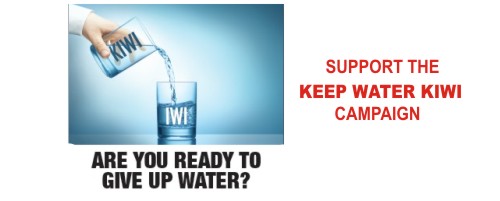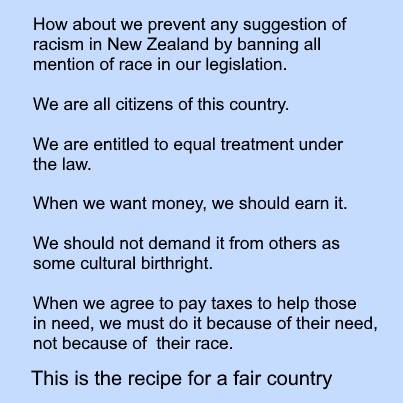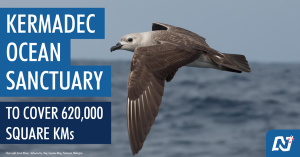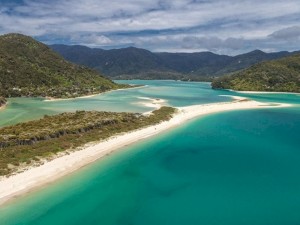
The New Zealand Herald article 26/4/16
By Dr Don Brash
ACT OF PARLIAMENT MADE WATER OWNERSHIP CLEAR
In the Weekend Herald recently, Lizzie Marvelly used her column to deplore what she called “racist sentiment . . . from a disaffected group of extreme right-wing former politicians” who had been responsible for running advertisements highlighting the Government’s intention to involve iwi in decisions about the allocation of water.
I don’t see myself as “extreme rightwing”, but I am certainly a former politician and, as the spokesman for the campaign to highlight the Government’s intentions with respect to water, it is hard for me to avoid the conclusion that she was referring to me.
Ms Marvelly said some things with which I agree. She listed the ways in which all New Zealanders have an interest in water— rivers, lakes and coastlines.
She made the point that all New Zealanders have a strong interest in ensuring water quality is improved and maintained. Precisely. Then why does she support the Government’s proposal to give a racially selected group of New Zealanders — those who can claim at least one Maori ancestor — a preferential role in planning how water can be used?
SURELY THOSE WHO WANT TO PROVIDE PREFERENTIAL ACCESS TO ANY RESOURCE PURELY ON THE BASIS OF RACE ARE THE REAL RACISTS, NOT THOSE WHO OPPOSE RACIAL PREFERENCE?
Make no mistake: A PREFERENCE BASED ON RACE IS WHAT THE GOVERNMENT PROPOSES. In the consultation document issued a few weeks ago, it states the Government wants to ensure “iwi and hapu are able to participate in decision-making about fresh water in their rohe”.
The document notes the Government proposes to amend the Resource Management Act to provide for new rohebased agreements between iwi and councils for natural resource management. These agreements will be initiated by iwi through notice to the councils, and set out how iwi and councils will work together in plan-making, consenting, appointment of committees, monitoring and enforcement, bylaws and councils’ other statutory responsibilities.
IN OTHER WORDS, THE GOVERNMENT PROPOSES CO-GOVERNANCE BETWEEN LOCAL GOVERNMENT AND IWI ON A VAST SCALE.
Ms Marvelly may see nothing wrong with that, and refers at one point to Maori being the Crown’s “Treaty partner”.
She further claims that Maori interests in water “are supported by the common law custom of Native Title”, the basic tenet of which “is that a change in sovereignty doesn’t automatically mean a change in property ownership. In our local context, it means Maori have rights and interests in land and water until they voluntarily decide to gift, sell or assign them”.
But to suggest that Governor Hobson really saw himself, on behalf of Queen Victoria, entering into a partnership with a large number of chiefs, many of whom could neither read nor write, has to be a total nonsense, Lord Cooke notwithstanding. Yes, a change in sovereignty does not automatically mean a change in property ownership, and Article II of the Treaty made that quite explicit — the property rights of those who signed the Treaty were to be respected.
Land was to be bought from Maori, not merely confiscated, and where confiscation took place in a way seen as unfair nearly 200 years later, today’s taxpayers are paying compensation for that action.
But as several prominent Maori have said in recent times, Maori never regarded themselves as owners of water, and even had they done so, an act of Parliament almost 50 years ago made it clear that nobody owned water.
This month former Maori Council chairman Maanu Paul said any commercial operation should have to pay a fee for using water “because these people are profiting from the use of a common good that belongs to Maori”. Total nonsense.
There may well be merit in local governments charging a fee for the use of water, but if so that fee should belong to the local government levying it, not to a group which claims ownership because some of their ancestors were Maori.
The Treaty of Waitangi conferred on Maori the “rights and privileges of British subjects”, an extraordinarily far-sighted thing to have done in 1840.
But there was absolutely no suggestion in the Treaty that those with one or more Maori ancestors should have superior governance roles over resources, or in local government, 176 years later.
It is also ludicrous to suggest that, when Maori sold land, they somehow imagined that they retained an ownership interest in the water which flowed over it.
ENDS.





